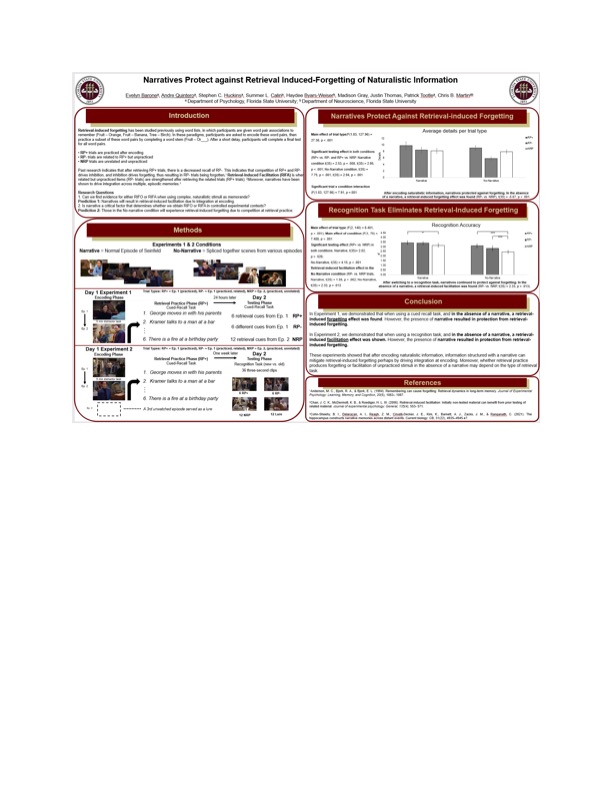Research Symposium
24th annual Undergraduate Research Symposium, April 3, 2024
Evelyn Barone Poster Session 4: 2:45 pm - 3:45 pm /118

BIO
My name is Evelyn Barone and I currently attend Florida State University. My majors are Psychology and Public Health with a minor in Sociology. I am interested in being a Psychiatric Physician Assistant in the future! I enjoy spending time with friends, and drawing, and my favorite TV show is New Girl.
Narratives Protect against Retrieval Induced-Forgetting of Naturalistic Information
Authors: Evelyn Barone, Chris MartinStudent Major: Psychology and Public Health
Mentor: Chris Martin
Mentor's Department: Department of Psychology Mentor's College: Arts and Sciences Co-Presenters: Andre Quintero
Abstract
Retrieval practice increases the likelihood of later recalling practiced information. Interestingly, it also affects the likelihood of later recalling unpracticed material. In some instances, this can cause retrieval-induced forgetting (RIFO), which is assumed to be driven by the inhibition of unpracticed items during retrieval practice. In other contexts, retrieval practice can facilitate recall of unpracticed information (retrieval-induced facilitation; RIFA), which is thought to reflect integration at the time of encoding. Here, we asked whether narratives, which promote integration, protect against RIFO using an experimental paradigm with three distinct phases: encoding, retrieval practice, and final test. During encoding, participants viewed naturalistic stimuli that either contained a narrative or did not. We used an unaltered episode of the television show “Seinfeld” as a stimulus in the narrative condition, and an edited version of “Seinfeld” containing scenes from multiple different episodes as a stimulus in the no narrative condition. Retrieval practice was completed for a subset of the scenes immediately after encoding. In the final test stage, they completed either a cued recall task (Experiment 1, 24-hour delay) or a recognition memory task (Experiment 2, 7-day delay). We hypothesized RIFO in the no narrative condition of both experiments, but not in the narrative condition, which would benefit from the protective effects of integration. We found mixed support for these predictions. Narratives did indeed protect against RIFO in the narrative condition when using a recall task (Experiment 1), but not when using a recognition memory task (Experiment 2).
Keywords: Retrieval-Induced Forgetting

